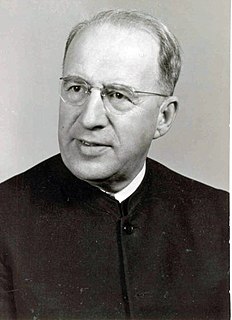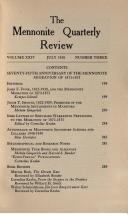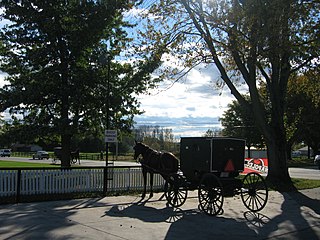John Horsch (18 December 1867 in Giebelstadt - 7 October 1941 in Scottdale, Pennsylvania) was a Mennonite historian and writer.
Contents

John Horsch (18 December 1867 in Giebelstadt - 7 October 1941 in Scottdale, Pennsylvania) was a Mennonite historian and writer.

John Horsch was born in Germany in Giebelstadt near Würzburg to Elder Jacob Horsch and his wife Barbara Landes. He married Christine Funck and was the father of three sons and a daughter, Elizabeth Horsch Bender, wife of Harold S. Bender. [1]
John Horsch studied for two years at the Bavarian State Agricultural School at Würzburg, graduating with a diploma in 1886. To avoid military service, he emigrated to the United States in 1887. He was employed by John F. Funk in the Mennonite Publishing Company, where he did much of the editorial work on German language publications from 1887 to 1895. He then served on the editorial staff of the Light and Hope Publishing Company of Cleveland Ohio before moving on to the Mennonite Publishing House of Scottsdale Pennsylvania, where he worked from 1908 to 1941. He worked as an editor an writer on history and theology for 55 years. He passed to his reward on October 7, 1941. [2]

Anabaptism is a Christian movement which traces its origins to the Radical Reformation. The movement is seen by outsiders as another offshoot of Protestantism, although this view is not shared by Anabaptists, who view themselves as a separate branch of Christianity.

Menno Simons was a Roman Catholic priest from the Friesland region of the Low Countries who became an influential Anabaptist religious leader. Simons was a contemporary of the Protestant Reformers and it is from his name that his followers became known as Mennonites.

Theology of Anabaptism is the beliefs of the Anabaptist movement. Anabaptism has a reputation of de-emphasizing theology in deference to living righteously. The various branches of the Anabaptist movement take slightly different approaches to theology.

Pilgram Marpeck, also Pilgram Marbeck or Pilgrim Marpeck, was an important Anabaptist leader in southern Germany in the 16th century.

The Radical Reformation represented a response to corruption both in the Catholic Church and in the expanding Magisterial Protestant movement led by Martin Luther and many others. Beginning in Germany and Switzerland in the 16th century, the Radical Reformation gave birth to many radical Protestant groups throughout Europe. The term covers radical reformers like Thomas Müntzer and Andreas Karlstadt, the Zwickau prophets, and Anabaptist groups like the Hutterites and the Mennonites.
The Mennonite Historical Library (MHL) is considered the world's most prominent and complete collection of resources and artifacts pertaining to Mennonites and related Anabaptist groups. It is housed in the Harold and Wilma Good Library on the campus of Goshen College in Goshen, Indiana. The specialty library was founded in 1906 under the guidance of Harold S. Bender and Ernst Correll. Historian John D. Roth is the current director.

Harold Stauffer Bender was a prominent professor of theology at Goshen College and Goshen Biblical Seminary. His accomplishments include founding both the Mennonite Historical Library and The Mennonite Quarterly Review. He served as President of the American Society of Church History, and was a major scholarly influence on fellow Mennonite theologian John Howard Yoder.

Michael Sattler was a monk who left the Roman Catholic Church during the Protestant Reformation to become one of the early leaders of the Anabaptist movement. He was particularly influential for his role in developing the Schleitheim Confession.
Alan Kreider was the American Professor Emeritus of Church History and Mission at the Anabaptist Mennonite Biblical Seminary in Elkhart, Indiana. His main interests were mission, worship, peace, and ecclesiastical history. Kreider continued to speak, write and publish in these areas of interest until his death in May 2017.

The Mennonite Quarterly Review is an American interdisciplinary review journal, devoted to Anabaptist and Mennonite history, theology, and contemporary issues.
John A. Hostetler was an American author, educator, and scholar of Amish and Hutterite societies. Some of his works are still in print.

The Groffdale Conference Mennonite Church, also called Wenger Mennonites, is the largest Old Order Mennonite group to use horse-drawn carriages for transportation. Along with the automobile, they reject many modern conveniences, while allowing electricity in their homes and steel-wheeled tractors to till the fields. Initially concentrated in eastern Lancaster County, Pennsylvania, their numbers had grown to 22,305 people resided in eight other states as of 2015. They share the pulpit with the Ontario Mennonite Conference but have some differences in Ordnung.
Guy F. Hershberger was an American Mennonite theologian, educator, historian, and prolific author particularly in the field of Mennonite ethics.
John Fretz Funk was a publisher and leader of the Mennonite Church. Funk published the Herald of Truth from 1864 until 1908 when it merged with the Gospel Witness to form the Gospel Herald. Jacob Clemens Kolb, in his preface to Bless the Lord, O My Soul quotes an unnamed commentator who said, "John F. Funk is the most important [Mennonite] man after Menno Simons."
The Mennonite Church USA Archives was founded in 2001 under the denominational merger of the (old) Mennonite Church and the General Conference Mennonite Church. Prior to 2001, the two largest Mennonite denominations maintained separate archives: the Archives of the Mennonite Church, located on the Goshen College campus, housed materials pertaining to the (old) Mennonite Church, while the Mennonite Library and Archives on the Bethel College campus held the records of the General Conference Mennonite Church.
John C. Wenger was an American Mennonite theologian and professor.
The Herald of Truth was a religious newspaper founded by John F. Funk in 1864. It was the first periodical of the "Old" Mennonite Church (MC) and was also published in German as the Herold der Wahrheit. Funk published the Herald through Charles Hess of Chicago, Illinois, until 1867, when Funk's own company, John F. Funk & Brother took over publication in Elkhart, Indiana. The newspaper was sold to the Mennonite Publication Board in 1908.
George Jay Lapp was an American missionary to India for the Mennonites. He was ordained in 1905 and became a Bishop in 1928 while in India. Lapp served as interim president of Goshen College from February 1918 until June 1919.
The Mennonite Publishing Company was a publishing agency in Elkhart, Indiana, operating primarily from 1875-1908, which under John F. Funk served as the main source of published material for the (old) Mennonite Church. The Mennonite Publishing Company was the third and final agency through which Funk published a great deal of historical and denominational Mennonite texts and periodicals, having previously published as "John F. Funk" from 1864-1869 and "John F. Funk and Brother" from 1869-1874.
The Mennonite Publication Board was founded in 1908 in Scottdale, Pennsylvania, as an organization through which the (old) Mennonite Church could own and operate its own publishing and periodicals. It served as the overseeing board for the printing and sale of denominational texts, operating the Mennonite Publishing House in Scottdale along with several bookstores throughout the United States and Canada, until 2002.